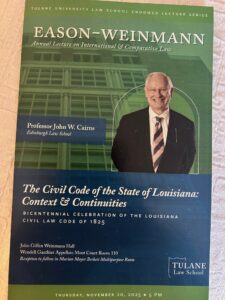The year of 2025 has been marked in Louisiana by celebrations of the bicentenary of the promulgation of the Civil Code of 1825. In this blog there has been attention to some of them, such as the major academic conference held at Louisiana State University towards the end of March, through to the gala dinner held in the Second World War Museum in New Orleans. The general programme was under the auspices of the Supreme Court Historical Society.
Some final events were organised at Tulane Law School by Professor Vernon Palmer. First was an Eason-Weinman Annual Lecture on International and Comparative Law on 20 November 2025, honoured by the presence of Mrs Virginia Eason-Weinman. This was delivered by your blogger on the topic of “The Civil Code of the State of Louisiana: Context and Continuities”. He discussed the background to the enactment of the Civil Code, before exploring in some detail the progress of the enactment of revisions to the first Code that of 1808, and the problems in the way of its promulgation.

The next day there was an expert seminar. Professor David Deroussin of université Jean Moulin Lyon III presented a rich and detailed discussion of “The Concept of Cause in the Louisiana Civil Code: A French Point of View”. This was a rich and detailed discussion, showing the origins, context an indeed continuities of the articles in the Code. This was followed by a paper by Professor Jörg Fedtke of Tulane Law School exploring the topic of “Code, Statutes, Common Law: Parental Immunity”. Professor Mateusz Grochowski, also of Tulane Law School, spoke next on the question of consumer law and protection in Louisiana, and how it is structured in relation to the Code, with its traditional Roman-law provisions on redhibition and lesion. He was followed by Professor Viviana Kluger of the University of Buenos Aires who spoke on “Spanish Law Roots in Louisiana; The Derecho Indiano, its Application to Everyday Life in New Orleans in the Second Half of the Eighteenth Century, and its Projections in the 1808 and 1825 Codifications. She presented fascinating material on the regulation of life in New Orleans under the Spanish regime in accordance with the derecho indiano. After this Professor Olivier Moréteau (L.S.U.) spoke on “The Civil Codes of Louisiana in their Natural Order”. This was a rich presentation examining the significance of references to and discussions of natural law in cases in Martin’s Reports. Professor Agustín Parise of Maastricht followed with a paper entitled “Dissemination of the Civil Code of Louisiana (1825) Amongst Foreign Legal Institutions During the Second Half of the Nineteenth Century. He showed how, in the context of the civilian legal renaissance in Louisiana, there was a deliberate project to donate copies of the Louisiana Legal Archives to foreign institutions and universities. The session concluded with a presentation on “Formalism in the Law of Wills under the 1825 Civil Code: Lessons for the Modern Day” by Professor Ronald Scalise of the home team of the Tulane Law School. He explored the formalities of wills and puzzling increase of excessive formalism in the modern courts, focusing on often trivial formalities rather than testatorial intention, on the spurious grounds that it was required by the Civil Code.
This was an intellectually rich event. A book will follow.

